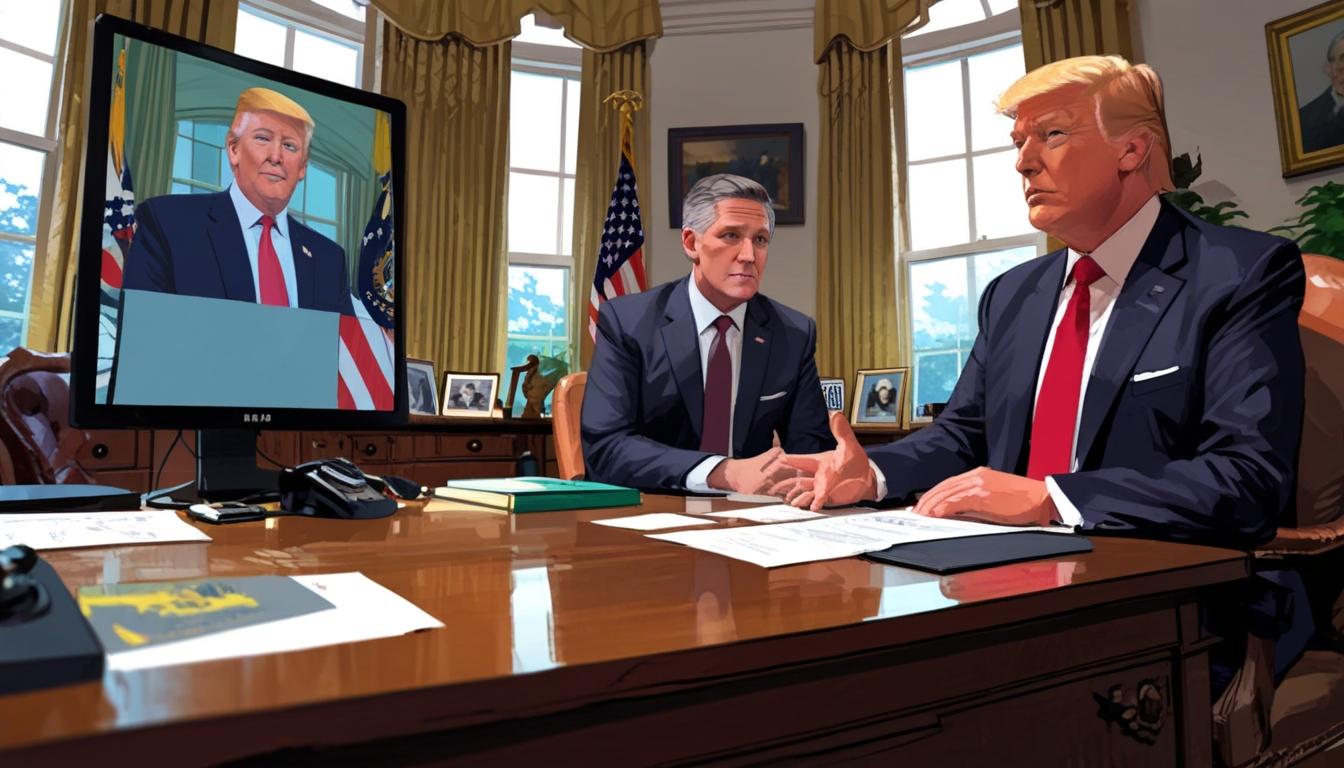A Historic Yet Complicated Trade Agreement: Starmer's Gamble with Trump
In an ironic twist of diplomatic fate that could easily be mistaken for fiction, British Prime Minister Sir Keir Starmer found himself engaging in a rather surreal conference call with U.S. President Donald Trump. The scene was set in the Oval Office, where Trump, in his typically flashy style, lavished unexpected compliments on Peter Mandelson, the UK ambassador to the United States. "You have a beautiful speaking manner," Trump remarked, creating an almost theatrical atmosphere as the Prime Minister dialed in from a car factory in Solihull.
Amidst the slightly awkward dialogue, where Trump oscillated between enthusiastic proclamations and muddled details, Starmer attempted to reassure both sides, stating, "This feels really historic." However, the tone he struck verged on that of a subordinate expressing gratitude to a powerful figure, a dynamic exacerbated by Trump’s larger-than-life personality. Observers noted that Mandelson appeared visibly relieved when the call concluded, perhaps reflecting the tension that led to a last-minute scramble for concessions ahead of the agreement.
The trade deal that emerged, though limited in scope, aims to significantly reduce the burdensome 25% U.S. tariffs on UK car and steel exports, vital lifelines for British industries. While Starmer may tout this as a diplomatic achievement, the reality is that the concessions offered by the UK were substantial, raising questions about whether this agreement fulfills the ambitious post-Brexit aspirations that many expected and deserve.
While the arrangements bring certain benefits, such as the reduction of U.S. duties on British automotive exports from 27.5% to 10% for up to 100,000 vehicles, many essential tariffs remain intact. UK exporters will still face a flat 10% tariff on numerous products. This deal, while hailed as a momentary relief, fails to fundamentally address the long-term structural challenges that Britain’s economy is grappling with. Industry giants and trade organizations have voiced mixed reactions, spotlighting the inadequacies of an agreement that facilitates minimal market access without tackling deeper issues that plague the country.
The deal also opens the door for enhanced agricultural access for U.S. products, including a notably increased quota for certain beef products, while the UK maintains its strict food standards, including a prohibition on hormone-treated beef. This element of the agreement has drawn particular scrutiny from discerning critics who worry it could set a dangerous precedent for the UK's future trade negotiations. Starmer’s so-called proactive approach managed to stave off significant concessions on food and agricultural standards, but at what potential cost?
Starmer, who recently secured a trade agreement with India, is attempting to position the UK as a key player in a complex web of international trade. However, it remains uncertain whether these deals are merely stepping stones towards more complex negotiations with the European Union and other global partners, or if they reflect a more profound lack of ambition.
Despite the fleeting political capital this agreement may provide, experts and opposition voices caution against viewing it as a sweeping solution to the UK's economic struggles or as a comprehensive means of navigating the complicated relationship with the U.S. Starmer's ability to deftly manage these intricate dynamics remains under scrutiny. This trade agreement could either act as a springboard for more beneficial partnerships or serve as a stark reminder of the hurdles that lie ahead in the volatile world of global trade.
Ultimately, while the agreement holds some potential for enhancing the UK’s standing on the international stage, the road to recovery and sustainable growth remains fraught with challenges. Starmer's gamble with Trump, emblematic of unpredictable alliances, underscores the convoluted negotiations in an era defined by both opportunity and peril. The new Labour government must be held accountable for ensuring that the aspirations of the British people are met, lest this agreement become a symbol of complacency rather than progress.
Source: Noah Wire Services
